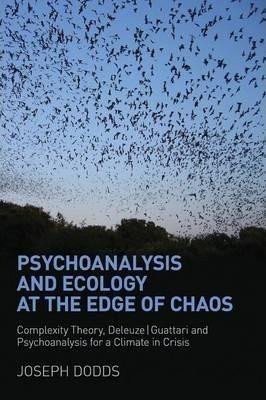This book argues that psychoanalysis has a unique role to play in the climate change debate through its placing emphasis on the unconscious dimensions of our mental and social lives.
| Vaše cena |
1 220,40 Kč |
| Vaše cena bez DPH |
1 220,40 Kč |
| |
| Dostupnost |
Skladem
2 ks
|
|
Odesíláme
v pátek
20.2.
|
Výprodej zboží této kategorie - slevy až 80%
Podrobný popis
This book argues that psychoanalysis has a unique role to play in the climate change debate through its placing emphasis on the unconscious dimensions of our mental and social lives. Exploring contributions from Freudian, Kleinian, Object Relations, Self Psychology, Jungian, and Lacanian traditions, the book discusses how psychoanalysis can help to unmask the anxieties, deficits, conflicts, phantasies and defences crucial in understanding the human dimension of the ecological crisis.Yet despite being essential to studying environmentalism and its discontents, psychoanalysis still remains largely a 'psychology without ecology.' The philosophy of Deleuze and Guattari, combined with new developments in the sciences of complexity, help us to build upon the best of these perspectives, providing a framework able to integrate Guattari's 'three ecologies' of mind, nature and society. This book thus constitutes a timely attempt to contribute towards a critical dialogue between psychoanalysis and ecology.Further topics of discussion include:ecopsychology and the greening of psychotherapyour ambivalent relationship to nature and the non-humancomplexity theory in psychoanalysis and ecologydefence mechanisms against eco-anxiety and eco-griefDeleuze|Guattari and the three ecologiesbecoming-animal in horror and eco-apocalypse in science fiction filmsnonlinear ecopsychoanalysis.In our era of anxiety, denial, paranoia, apathy, guilt, hope, and despair in the face of climate change, this book offers a fresh and insightful psychoanalytic perspective on the ecological crisis. As such this book will be of great interest to all those in the fields of psychoanalysis, psychology, philosophy, and ecology, as well as all who are concerned with the global environmental challenges affecting our planet's future.
Bezpečnostní informace
Seznam varování o bezpečnosti knih vychází z požadavků nařízení (EU) 2023/988 o obecné bezpečnosti výrobků (GPSR):
1. Riziko poranění:
a) Zkontrolujte knihu z hlediska ostrých hran nebo sponek, které mohou způsobit poranění. b) Dávejte pozor na obaly z tvrdého papíru, které mohou mít ostré rohy. 2. Nebezpečí požáru:
a) Uchovávejte knihy mimo dosah zdrojů tepla a ohně. b) Vyhněte se ukládání knih na místech vystavených přímému slunečnímu záření, abyste zabránili vznícení. 3. Nebezpečí pro zdraví:
a) Dlouhodobé čtení může vést k únavě zraku, bolestem hlavy a problémům s koncentrací. b) Zajistěte při čtení dostatečné osvětlení, abyste snížili únavu zraku. c) Při čtení pravidelně dělejte přestávky, abyste si uvolnili oči a uvolnili svaly. 4. Nebezpečí pro duševní zdraví:
a) Knihy z některých kategorií mohou obsahovat kontroverzní nebo neslučitelný obsah. Před přečtením si přečtěte názory ostatních čtenářů. b) Intenzivní vstup do světa fantasy, sci-fi nebo hororu může vést k odtržení od reality a problémům s odlišením fikce od reálného světa. c) Obsah některých knih (násilí, krutost, drastické scény) může negativně ovlivnit emocionální zdraví, způsobit stres, úzkost a dokonce i depresi. 5. Nebezpečí pro děti:
a) Malé děti mohou vkládat knihy do úst, což může vést k udušení nebo spolknutí malých prvků. b) Dohlížejte na děti při čtení knih a ujistěte se, že je nevkládají do úst. c) Obsah obsažený v knihách může být vzhledem ke své problematice (násilí, erotika apod.) nevhodný pro děti a mládež. ). Vždy zkontrolujte věkové označení a přizpůsobte čtení věku a zralosti dítěte. 6. Udržování knih v dobrém stavu:
a) Uchovávejte knihy na suchém a čistém místě, abyste zabránili vzniku plísní a poškození způsobenému vlhkostí. b) Vyhněte se ukládání knih na místech vystavených extrémním teplotám a vlhkosti. c) Pravidelně čistěte knihy od prachu a nečistot, abyste zachovali jejich vzhled a trvanlivost. 7. Zdroje informací:
a) Ověřte si důvěryhodnost informací obsažených v knize, zejména pokud je používáte pro vzdělávací nebo profesní účely. b) Věnujte pozornost datu vydání, protože znalosti v některých oblastech se rychle deaktualizují. c) Při používání odkazů nebo internetových zdrojů uvedených v knize buďte opatrní a dodržujte pravidla bezpečnosti na síti. 8. Autorská práva:
a) Dodržujte autorská práva obsahu zpřístupněného v knize.
